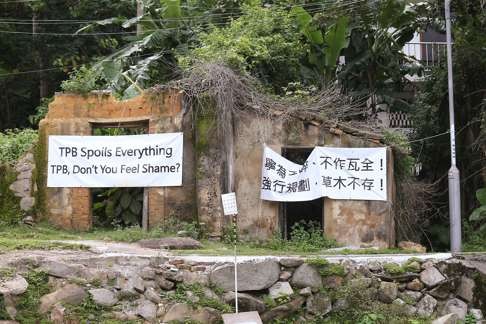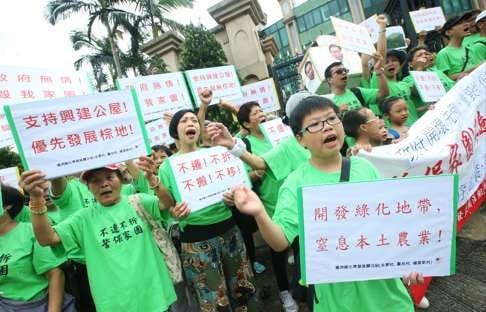
How to solve the rural land development challenge
Adopting a market-oriented process based on an annual land rent in the New Territories could help resolve a dispute that dates back to 19th century colonial times
Newly elected lawmaker Eddie Chu Hoi-dick has declared war on land corruption deals in the New Territories and vowed to fight “government-developer-rural-triad cronyism.” A rural leader has retorted that this is not “cronyism” but “cooperation”.
The true economic nature of the rural land development challenge in the New Territories needs to be better understood if a solution that is in the long-term interests of all is to be found.
In 1899, when the British took over the New Territories, they chose to recognise the rights of the 100,000 or so indigenous inhabitants with regards to land use, land inheritance, and marriage laws. Arrangements were made for residents to prove ownership and be given title to their land registered under the Block Government Lease.
A better approach would be to collect an annual land rent on agricultural land in the New Territories when land is converted into other uses
These leases did not allow the land to be built on or converted to other uses without permission. But in the 1970s, when the government adopted a policy to build satellite towns and public housing estates and needed more land, the Letters A and B schemes provided a market-oriented mechanism through which government could tap middlemen and market forces to facilitate agricultural land conversion and sales. The Small House Policy also provided a form of compensation to the inhabitants.
Subsequently, in the 1980s, there was demand for vacant land for parking container boxes in the New Territories following China’s opening. The indigenous villagers obliged. Despite legal challenges by the government, the Court of Appeal ruled that agricultural land under the Block Government Lease could be used for any purpose that did not require a building.

The court decision had a knock-on effect on the land use conversion premium for agricultural land in the New Territories because the land now had a demonstrated commercial use. Getting the government and villagers to an agreed settlement on the premium became far more difficult without a change in government attitudes towards compensation for agricultural land that already had an accepted alternative commercial use.
A market mechanism could help to settle prices and middlemen could help to assemble land. But the politically charged environment today has made market mechanisms suspect. Without market mechanisms, the transactions cost of negotiating land conversion transactions becomes very high and delays become the norm. By implication, housing prices will not come down. In the longer run, economic growth will also be adversely impacted.
What are the alternatives then?
One approach is to follow the logic of Eddie Chu, who advocates democratic participation of all stakeholders to make a collective decision. There are two reservations about such an approach.
First, it would be foolish to believe this could happen any time soon without radical political reform, which is not really on the horizon at the moment.
Second, even if reform magically takes place and makes it possible for government to aggressively appropriate agricultural land, would this be a desirable solution? Such draconian steps would completely undermine the private property rights system of land ownership in Hong Kong, as we know it.

A better approach would be to collect an annual land rent on agricultural land in the New Territories when land is converted into other uses, and thus avoid having to negotiate a lump sum land conversion premium at the outset.
Any future owners building on newly converted agricultural land would pay an annual land rent to government assessed at a constant percentage of the market value of the property. The pre-determined percentage could be different for residential, commercial or industrial uses of the land and be set with reference to historical relativities. This would be transparent and avoid costly and time-consuming negotiations to determine the conversion premium case by case.
Developers that bought land from landowners would have full knowledge of the future land rent chargeable. The market price for land would then be determined by competition. Middlemen would still be involved in land assembly but know what will be the future land rent charges. The transactions’ cost of negotiation would therefore be significantly reduced.

Moreover, with greater transparency and predictability in conversion premiums and land prices, development plans would be more easily implemented and the value of democratic participation in the planning consultation stage would be meaningful.
One final issue is the recognition of rural squatter rights in the New Territories. Currently they are compensated only for loss of abode, but not of livelihood. One possible answer is to make development contingent on offering registered rural squatters either cash compensation or the right to continue farming activities in high-rise structures incorporated in the planning stage.
A more market-oriented process will give far more scope for efficient and effective decentralised decision-making and make the development of the New Territories work in the interests of all parties. The benefits of fewer development delays will not only improve economic and social well being, but also make Hong Kong a less politically polarised city.
Richard Wong Yue-chim is Philip Wong Kennedy Wong Professor in Political Economy at the University of Hong Kong

